Related Research Articles

Adalberto Ortiz - born Adalberto Ortiz Quiñones was a novelist, poet and diplomat born in Esmeraldas, a province of Ecuador.

Alfredo Pareja Diezcanseco — born Alfredo Pareja y Díez Canseco — was a prominent Ecuadorian novelist, essayist, journalist, historian and diplomat. An innovator of the 20th-century Latin American novel, he was a founding member of the literary Grupo de Guayaquil, which brought a new emphasis to realistic novels.
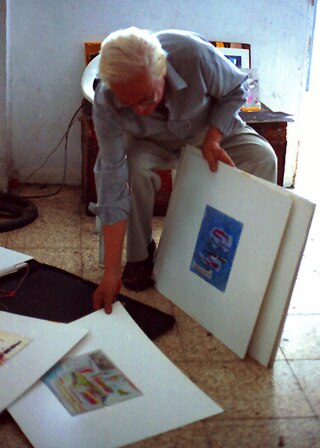
Luis Enrique Tábara was a master Ecuadorian painter and teacher representing a whole Hispanic pictorial and artistic culture.
Iván Carvajal Aguirre is an Ecuadorian poet, philosopher and writer. In 1984 he received Ecuador's National Prize for Literature, the "Aurelio Espinosa Pólit" prize, for his work entitled "Parajes". In February 2013 he won the Premio a las Libertades Juan Montalvo.
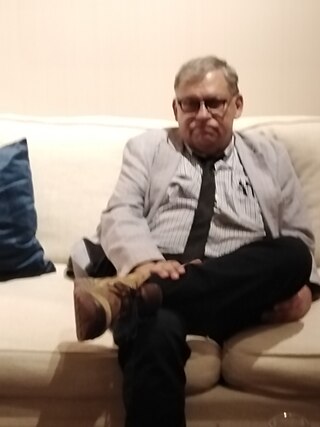
Lauro Zavala is a scholarly researcher, known for his work on literary theory, semiotics and film, especially in relation to irony, metafiction and micro-narratives. Faculty professor since 1984 at Universidad Autónoma Metropolitana, Xochimilco, in Mexico City, where he is head of the area on Intertextual Semiotics.

Enrique Gil Gilbert was an Ecuadorian novelist, journalist, poet, and a high-ranking member of the Communist Party of Ecuador.
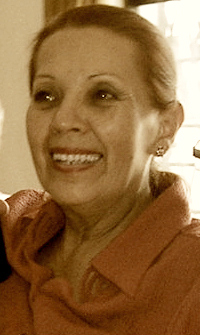
Violeta Luna is an Ecuadorian poet, essayist, professor and literary critic.
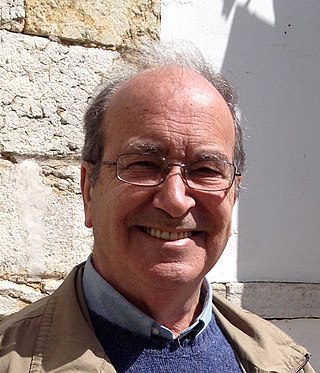
Juan Manuel Rodríguez López is a Spanish-born, naturalized Ecuadorian author and professor. He holds a licenciate/BA degree in philosophy and a doctorate in literature from Pontificia Universidad Católica del Ecuador (PUCE). He was a professor at Universidad Central del Ecuador and Universidad Católica, as well as a founding professor of Universidad San Francisco de Quito, where he was Dean of the College of Communication and Contemporary Arts.

Aminta Buenaño Rugel is an Ecuadorian writer and politician.
Iván Oñate is an Ecuadorean poet and academic. Oñate was born in on March 17, 1948, in Ambato, Ecuador. He lives in Quito, Ecuador. He has been called “the most original poet of the new generation” by French critics Jean Franco and Jean-Marie Lemogodeuc They further remark that “one must pay attention to his disquieting visions, to his taste for life and vertigo, to his wild revelations mixing anguish and delirium.” He has published eight books of poetry and fiction, and his widely anthologized work has been translated into at least five languages.
Blanca Eugenia Viteri Segura was an Ecuadorian writer, anthologist, women's rights activist, and teacher. She has been described as "a grand dame of Ecuadorian literature."
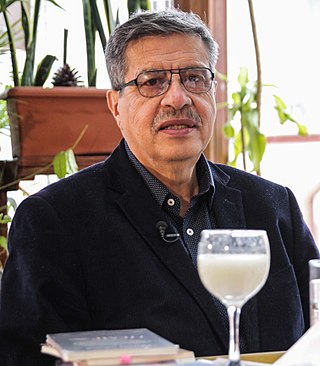
Abdón Ubidia is an Ecuadorian writer who is considered one of the most representative and relevant voices of modern Ecuadorian literature. He was the 2012 recipient of the Premio Eugenio Espejo in Literature, awarded to him by President Rafael Correa.

Rafael Díaz Ycaza was an Ecuadorian poet, novelist, short story writer, and columnist for the Ecuadorian newspaper El Universo.
Cecilia Eudave is a Mexican writer, researcher, and university professor.

Luis Aguilar Monsalve is an Ecuadorian writer, critic, and professor emeritus at Hanover College in the United States.
Luz Argentina Chiriboga is an Afro-Ecuadorian writer who was one of the first writers to address the duality African and Hispanic cultures. In her poetry and novels, she writes about women in ways that challenge preconceived stereotypes. Her short story "El Cristo de la mirada baja" won first prize in 1986 in the International Literary Contest of the Liberator General San Martín held in Buenos Aires.
Elisa Ortiz de Aulestia (1909–1991) was an Ecuadorian teacher and writer. Her ideas reflected the principles of the feminist movement in the 60´s. Women´s development through education is the main topic of many of her pedagogical reflections. As an active socialist, she was a member of the PSE as she believed it to be the national revindication movement, that represented principles to fulfill Ecuadorian needs. She and her husband invested their intellectual effort, as well as their own economic resources, to change the methodology that teachers used in Ecuadorian schools. Her work is considered a milestone in the struggle to reach quality education for women.
Cecilia Ansaldo Briones is an Ecuadorian professor, essayist, and literary critic.
Gilda Holst Molestina was an Ecuadorian writer and academic. Her narrative made use of humor and irony, in addition to the treatment of themes related to gender inequality.
Ecuadorian literature has been characterized for essentially being costumbrista and, in general, closely linked to events that are exclusively national in nature, with narratives that provide a glimpse into the life of the common citizen.The origins of Ecuadorian literature go back to the ancestral narratives that were passed down from generation to generation. These first stories dealt with fantastical, mythological, and legendary themes.